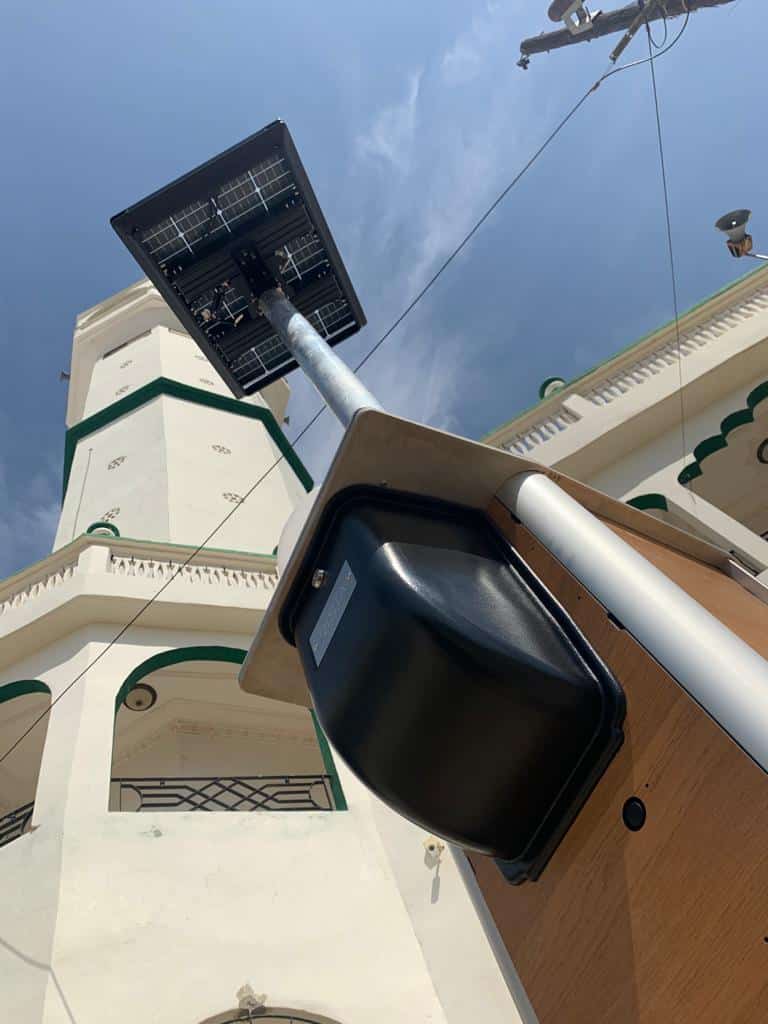Vector-borne disease prevention in Senegal: one year after its inauguration in Kaolack, the eco-friendly mosquito trap from the French company QISTA has had incredible results.
A member of the French Healthcare Association, Quista stands alongside the largest international groups that make up the global health community and launches malaria control and mosquito control campaigns in several countries such as Senegal and Mali.
One year after the installation of their eco-friendly mosquito traps in Senegal, the results are impressive: the data collected on the QISTA CONNECT web application show in particular that the month of September 2021 – in the middle of the rainy season – is the month which recorded the greatest capture of 72,405 mosquitoes. A significant peak exceeding 500 captures per hour was even recorded on September 18.

QISTA’s eco-friendly mosquito trap, through the “MoniPrev” project – the result of Franco-Senegalese cooperation, have proven to be a relevant, effective and complementary technology to public mosquito control actions in Kaolack. QISTA is a real prevention tool against mosquitoes, which are potential disease vectors, and will continue to support the Senegalese territory in its goal of eradicating malaria by 2030.
QISTA, the young French company which offers an innovative mosquito control solution using biomimicry, inaugurated the MoniPrev project in October 2020 at the El Hadji Ibrahima Niass regional hospital in Kaolack.
This project, financed by the General Directorate of the French Treasury, was part of the contest “Innovative solutions for the sustainable city in Africa” that QISTA had won in 2019 among 226 companies. A project carried out alongside the PNLP (National Program for the Fight against Malaria) which tries to find effective and complementary solutions to traditional mosquito control to meet the objective of 0 cases of malaria in Senegal by 2030.
Malaria in Kaolack reached 69.9% in 2018 and with 4,518 confirmed cases in 2019 including 24 deaths. The city is now home to 104 QISTA ecological mosquito terminals which have been gradually put into operation on 32 different sites starting from October 2020. Used as complementary technologies to the mosquito control solutions already deployed by the public authorities, they have been installed around very busy strategic areas where the risk of bites and therefore potential contamination is particularly high: regional hospital (16), health posts (67), school sites (6), religious sites (11), administrative sites (4).
In addition to reducing the proliferation of mosquitoes, and to preventing bites and vector-borne diseases, the QISTA eco-friendly mosquito trap is connected and allow the authorities to carry out precise analytical monitoring of mosquitoes and to objectively assess the vector-borne risks in the department of Kaolack.
Among the species captured since 2020, QISTA lists Anopheles spp, Aedes aegypti, and Culex spp. While capturing potential vectors, QISTA ecological mosquito eco-friendly mosquito traps thus make it possible to observe species variations over the course of a year. Anophelines, vectors of malaria, were particularly virulent during the rainy season (record of 62 captures by a marker in 24 hours) because they thrive in natural stagnant water (puddles, fields, etc.). QISTA also noted a massive presence of Aedes aegypti (record of 308 captures by a terminal in 24 hours) vectors in particular of dengue fever, zika, chikungunya, and yellow fever. This species, normally visible in the rainy season, has also been observed in significant numbers in the dry season, thus demonstrating a strong ability to adapt to its environment and resistance to traditional mosquito control methods. Culex spp, which has no seasonality, nevertheless challenges by its presence in large quantities (record of 1,000 captures by a terminal in 24 hours) which underlines the importance of carrying out close monitoring of this species. which is a vector of West Nile virus.
Pierre Bellagambi, Managing Director of QISTA: “The MoniPrev project conquered the health authorities of Senegal during the annual steering committee this January. We are very happy to provide an additional tool in the fight against vectors, which also makes it possible to refine the prevention already implemented by the local authorities. »
Baba N’DIAYE, President of the Departmental Council of Kaolack: “We are delighted with our fruitful collaboration with QISTA, which has enabled us to strongly prevent the vector risk in the department. »
While participating in the neutralization of mosquito vectors, QISTA complements traditional mosquito control in an ecological way, which still involves the use of pesticides and larvicides. On the strength of these first annual results, QISTA will continue its research work to further optimize the fight against mosquitoes and strengthen scientific monitoring in Kaolack, particularly to the west of Kaolack city and in Darou Mbiteyenne.
The company continues its development in African countries where the presence of mosquitos is a problem: installations in Ivory Coast – with the support of the National Institute of Public Hygiene -, in Burkina Faso with the French Army and in Mali (protection of a wastewater treatment area). In Djibouti, QISTA launched its own entomology and molecular parasitology laboratory in March 2021, the QISTA LAB. A novelty which resulted in the launch of a first study carried out in Djibouti since March 2021.
About QISTA and its solutions
Created in 2014 and based in Sénas in the Bouches-du-Rhône, QISTA specializes in eco-responsible mosquito control and vector-disease prevention. The company now employs nearly fifty people and achieved a turnover of €3.9 million in 2021. The company, managed by Pierre Bellagambi, has developed an eco-friendly mosquito trap which protects against bites but also allows the monitoring of mosquito populations for the purpose of preventing the diseases they can carry. At a low rate, similar to that of human breath, this patented solution emits recycled carbon dioxide and a discreet olfactory lure that mimics body odor. The device attracts the female mosquito (the male does not bite) who, once nearby, is sucked into a trap from which she cannot get out. A real prevention tool, the terminal also offers a real-time monitoring system using geolocated sensors that analyze the volume of mosquitoes captured, current and future infestation levels. Air Liquide, France Industrie and TDH entered the capital of the French start-up in 2017. QISTA is present today in more than 81 communities in 18 countries, for a total of nearly 7,500 terminals installed. In 2021, QISTA is one of the 21 “Industrial Territories” winners in PACA of the France Recovery Plan. In 2018, QISTA was awarded at CES in Las Vegas.
For more information on QISTA:
https://QISTA.com/fr/, @qista_technobam (Twitter)
@Qistamosquito (Facebook)
@qista_technobam (Instagram)
For more details on the QISTALab: https://qista.com/en/lab
Press contacts:
Marine DELABIE
[email protected]
